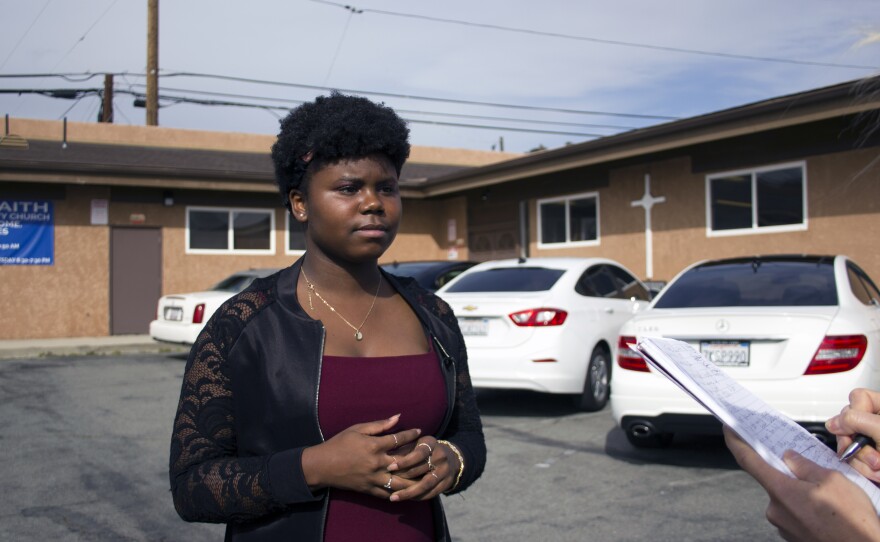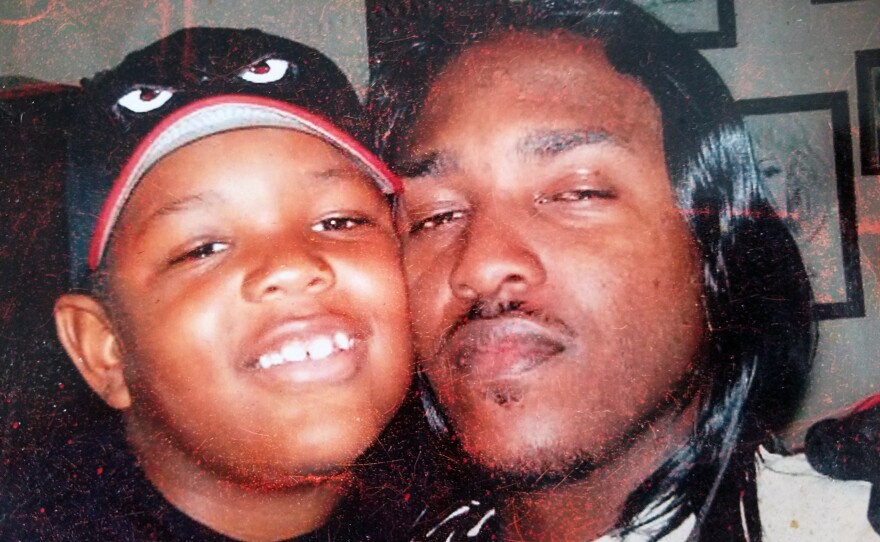This is a special six-part series called Dr J's. A new story will be published every day.
A few weeks after I went to the midnight New Year's Eve service at True Faith Missionary Baptist Church, I was back at a regular Sunday service.
This time, I was hoping to meet Tonya Waites. She’s the daughter of Carol Waites, one of the two women killed in the Dr J's Liquor shooting. Tonya Waites still attends the same church her mother went to, the church her mother was on her way home from when she was killed in the crossfire of a gang shooting.
There were more people at the Sunday service, maybe about 40, and Tonya Waites came in late after dropping off her two younger children at the church's Sunday school.
Her pastor had told me he'd let her know I was coming to meet her, but when I went to talk to her, she had no idea who I was. I couldn't imagine being approached by a stranger in the middle of church hoping to talk about when my mother was killed, but she was really kind about it. She asked me politely if we could talk later and gave me her phone number.
Then as I was in the church parking lot getting ready to leave, she walked outside with her oldest daughter, who, it turns out was Janise Waites, the little girl who was in the back seat of the car when her grandmother was shot.

Janise Waites, who is now 18 and a freshman in college, told me about what she remembers from that night.
"It's kind of like a three-year-old type of memory for me, like I think there was a dragon there. It's kind of like a story from a fairy tale," she said. "That to me is what my memory is, but as I get older, I realize that's not exactly what happened. It's nice having a memory that's kind of a little fake, despite it being real."
Her second cousin, who was seven years old at the time, shielded her with his body. He was shot multiple times but survived.
Janise Waites doesn't really remember that, and doesn't see that cousin any more — he moved away from San Diego. She talked really fast and moved her hands a lot as she described what must be one of her first memories.
"I have this childish view of it, rather than an adult-ish view of it. And I like the childish view," she said.
The "adult-ish" view, of course, is that her grandmother was killed, leaving her mother alone.
Her mother told me she still struggles with it. She was in Washington DC when the shooting happened and said before the trip she almost decided not to go — something felt funny to her — but her mom talked her into it. If she'd stayed in San Diego, she likely would have been in the car that night as well.
She said she had to leave San Diego after the shooting because everywhere she went she'd run into people who asked about it, about the search for who was responsible, and eventually about the trial.
Once the trial was over, she came back, feeling like she finally had closure.
Janise Waites said she knows her life would have been very different if her grandmother hadn't been killed. She seems to be flourishing, but she said she thinks she'd be even more "well-mannered," as she put it, if her grandmother was alive.
"From what I hear, she was very strict in certain places," she said. "Despite me being her favorite, I do see me wearing more dresses, being a lot cleaner around the house."
So far in this series, we've been talking about how the shooting at Dr J's has had ripple effects throughout the community and the rest of the city: a boost in police presence, more community cooperation with police, more attention to the gang violence that was going on. But it's also important to remember the effects the shooting had on the people directly involved — the families of the women who were killed and the family of the man who was eventually convicted of their murder.
The family of the man accused

I've visited Ida Campbell a few times in her small and clean apartment in Rolando, which she shares with her teenage grandson. On one visit, she showed me all the family photos she displays on her bookshelves and walls.
"This is him when he was little, and this is my grandmother," she said, pointing to a picture of an older woman holding a baby who looked to be about half her size. "Look at those long legs, he was not even a month old. When he was born, I had to take him back to the doctor three times in a week, they thought he had gigantism because he was as long as a two-month-old baby; he was really long."

Now Campbell's son James Carter is 6 foot 7, and she hasn't seen him in almost two years. He's been in Folsom Prison up in Sacramento, serving a life sentence without parole for murdering the two women outside Dr J's.
He's Campbell's only child, and he grew up with a mostly middle-class background. Campbell's father was one of the first black police officers in San Diego, and she owned her own business and worked as a model when Carter was a kid. He was born in San Diego.
"He was the cutest little thing," Campbell said. "I used to call him Doodlebug because he was so fat and roly poly, and you'd poke his little stomach, and he'd ball up like those potato bugs do."
When Carter was four, they moved to Solana Beach, where he would ride on surfboards and bring their dog Barney to the beach. Then, not long after, his father was killed in what Campbell said was a random shooting. She remarried and then divorced, and she and Carter moved to Talmadge.
But as a teenager, he started spending time with people in the Skyline gang, named after the neighborhood in Southeast San Diego.
Campbell said she isn't sure why her son started hanging out in Skyline. His dad's side of the family lived in Southeast San Diego but closer to Lincoln Park, which was rival gang territory.
"I remember he came home one day with some red suede Nikes on, Horton Plaza had just opened up," she said. "I said, 'Where did you get those shoes from? You know you cannot wear those shoes, you're going to go out there and get shot.'"
Red is the color associated with the Skyline gang. Like a lot of parents whose kids end up in trouble, Campbell sees this moment as a possible turning point, when she could have realized he was hanging out with the wrong people and changed the direction his life took. But of course that's only in hindsight. Campbell said thinking back on this moment, she wishes she'd right then sent him to live with family in Texas. But she wanted to be with him.
"When you get into a crucial moment of your child's life, you really don't want to let it go, for someone else to take care of because they might not have the same love and mindset as you might have," she said. "But that didn't work out too good, did it?"
Police focus on James Carter
The shooting at Dr J's was supposed to be a gang retaliatory shooting — Lincoln Park gang members had killed someone from Skyline a day earlier, so the Skyline gang was looking to hit back. So police were trying to figure out who from Skyline was involved.
Campbell isn't sure how police narrowed in on her son as the suspect. But when detectives first came to their home to talk to him, she said she wasn't worried. That's because she was his alibi.

The shooting happened on New Year's Eve, when a lot of people shoot their guns at the sky to celebrate. Campbell said at around midnight, her sister-in-law heard gunshots, called her house and asked where Carter was to make sure he was safe.
"She called, and I got up, said, 'Wait a minute, let me go see,' so I got up and went in there, and he had my grandson on his chest," Campbell recalled.
Pretty quickly Campbell started to realize the case against her son was serious. Police raided their home that spring after the shooting and took a bunch of things out of his room, including a bulletproof vest, ammunition and some broken guns.
And then, more than six years after the shooting, Carter was arrested.
He went to trial in 2011, and Campbell was one of the witnesses. In the trial transcripts from the case, the prosecutor Robert Hickey doesn't really dispute her story but instead suggests that maybe she doesn't remember the timeline of events perfectly. He points out she's been confused and given different answers about when things happened in the past.
Hickey also has a police detective testify that Carter might have been home when Campbell checked on him at midnight, and still would have had time to leave, go meet up with the other gang members and do the shooting just before 1 am.
But in the trial, Campbell disputed this. She said that if her son had left, he would have brought her his baby son who was sleeping on his chest.

Because it took so long for Carter to be arrested and convicted, he was home for the first eight years of his son's life.
Campbell started to cry as she talked about what she calls a great irony of her son's life.
"He raised that boy," she said, talking about her grandson. "Everybody says, 'Oh you did such a good job, he's going to college before he finished high school, he's never had a record, he's never done anything wrong.' But my son raised him. The first eight years of a child's life is what sets their mindset. My son did a very good job with him. He's not been able to touch his fingernail since he was eight, and he's 18."
Campbell said she believes her son will somehow get exonerated. And in some ways, she's thankful he's at least in prison and not dead — he can call almost every day and she's planning to drive up to Sacramento with her grandson to see him.
"I just want him to get out with the mentality and personality he had when he got in," she said, crying again as she spoke. "It's like somebody going to hell, coming back out, and now they're back among the living. It's like you're watching somebody get beat with a belt, and you're not getting hit, but you're feeling the licks, and you're doing all the reactions."
In our next story, we’ll examine the case against James Carter.








